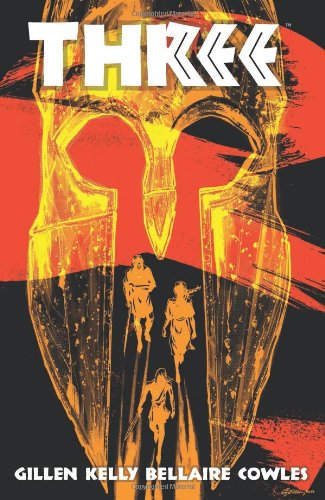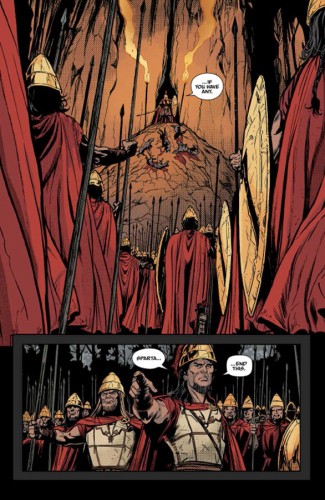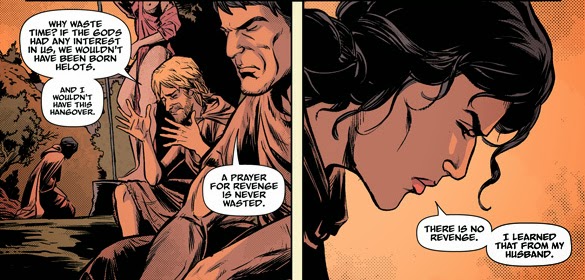
![]() Three by Kieron Gillen & Ryan Kelly
Three by Kieron Gillen & Ryan Kelly
Gillen is one of my favorite comic book writers for Marvel, so I was extremely eager to pick up Three, a new series written by him for Image. Otherwise, I wouldn’t normally find myself picking up a book on Ancient Sparta. I suppose I’ve always been partial to Athens. So, I had mixed feelings going into the book . . . and I have mixed feeling coming out of it as well.
Being the academic that I am, it pleases me to see that Gillen worked with Professor Stephen Hodkinson as an historical consultant, and I like the extensive notes in the back of this trade collection. Both Gillen and professor Hodkinson write these notes, and it’s enjoyable to see how clearly they enjoy discussing the historical material they had to work with and how that often questionable information had to be used to shape, but not fully determine, what is ultimately a fictional story about three people.

As an English professor, I think the story of three people against an historical backdrop is more interesting than the details of the historical backdrop itself. However, the basic historical situation must first be understood before I mention the characters: The Helots have such a harsh life that Gillen states directly in the comic that they are “Beneath slaves.” The sons of the free men, The Krypteia, undergo a “rite of passage” where they purge the strongest looking Helots once a year in order to keep any potential uprisings in check. Ironically, their very attempts at preventing uprisings give the Helots their greatest reasons to engage in rebellion: Revenge.
From the first few pages of the comic, then, we side with the Helots, and it’s no surprise that the THREE of the title are all Helots who have our sympathy before we even get to know them. The three are very different types, which makes their coming together have an interesting dynamic. Without going into much detail about the event that causes their crisis, they must join together, resolve their differences, and fight to stay alive.
Klaros is an attractive, manly butcher who, other than his injured leg, seems strong and self-possessed; Damar is a strong-spirited, beautiful young woman who is dark-haired like Klaros; and Terpander is as unlike Klaros as is possible: Though he has no injuries, he is skinny and looks more weakly than the injured Klaros. He is blonde and fair-skinned, and compared to Karos’s brooding silence, Terpander is a bubbling brook of words and puns that seem to annoy all who hear them.
I give these descriptions because they reveal the question at the heart of the story — How do people of such different temperaments come together and survive together under extreme pressure? Their survival itself touches on another thematic point: How does one’s environment shape character and identity? Gillen offers answers to that question by looking at what happens to three very different people who have in common only a very immediate threat to their lives, but he also asks it when he turns to the leaders of Sparta, one of whom says:
Lycurgus took a hound and a house-dog. He trained the house-dog to hunt and petted the hound. When it came to the test, the house-dog was a better hound than the hound. The point was training is more important than breeding. Our blood is irrelevant. What matters is what we do now.

For me, these thematic concerns make the story more interesting than it would be otherwise, but Three didn’t move me emotionally as much as I had hoped it would. Still, the three main characters and their verbal exchanges are what make me enjoy the book as much as I do. Each has a hidden history, secrets to reveal, and I like seeing them come to terms with one another’s past as well as their own. Finally, I love the art. My feelings are not divided there: Three is an absolutely beautiful book, and even though the book is not 100% historically accurate visually, the notes explain why Gillen and his team made the choices they did.
If you liked the movie 300 and are interested in the history of that time and place, then I can’t help but think you’d enjoy this book. Even if, based on your own knowledge of history, you don’t like all the choices made by Gillen, I think you’d greatly appreciate the trade edition just for the notes in the back that explain all the reasons for those decisions.
And if all else fails, you can sit back and enjoy the art.



"Nor Iron Bars a Cage by Kage Harper" Freudian slip there. ;)
[…] (Fantasy Literature): In 1957, Hammer Studios in England came out with the first of their full-color horror creations, […]
I'm going to have to find these and read them.
R ,if you live in the USA, you win a Fan Lit T-shirt (please specify 1st and 2nd preferred sizes)…
Great review. Thanks!